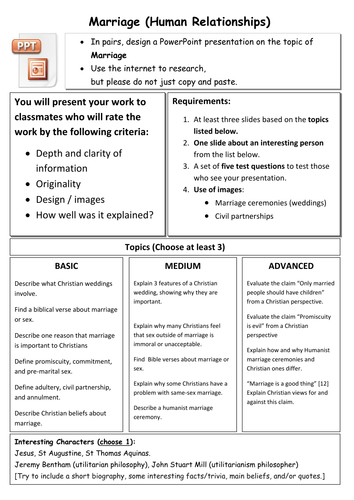Religion, Philosophy, Sociology & Ethics Resource Base
Resources for Religious Studies, Sociology, Philosophy, Ethics and Humanities. We specialise in making whole units and courses for ultimate convenience and time-saving. We always aim to make the best resource for a given topic: our goal is perfection and our resources have helped educate 1 million+ students! In order to encourage ratings and reviews, if you buy any of our products, are happy with your purchase, and leave a 5* rating for it: just email us and we'll send you a free bonus gift!

](https://d1e4pidl3fu268.cloudfront.net/74e6bb9a-81a8-45d5-9b4f-9cf2bacde72f/Lesson8.jpg)

![GCSE- Applied Ethics- Religious Studies -Christianity & Humanism [4 Whole Units: 140 Files!]](https://d1e4pidl3fu268.cloudfront.net/9e4e4fc9-43d1-455f-9a42-2e7a3f995419/Untitled1.jpg)
![The Sociology of Crime & Deviance (GCSE Sociology) [Complete teaching materials] (Over60 files!)](https://d1e4pidl3fu268.cloudfront.net/430c1dd2-2d42-4c00-bf80-d4e1d0813964/CrimePunishment.jpg)
![GCSE Christianity - THE ULTIMATE KS4 RESOURCE PACK [Over 220 Files!]](https://d1e4pidl3fu268.cloudfront.net/4d9a81b4-3695-4a3e-9e04-50ce844c9105/image4.png)
![GCSE- Philosophy of Religion -Christianity & Humanism [4 Whole Units: 100+ Files!]](https://d1e4pidl3fu268.cloudfront.net/450cdb2f-3c1e-4055-9abe-6cb87aae2efc/Untitled12.jpg)
![Whole School Debate Pack [Over 1000 Debates!]](https://d1e4pidl3fu268.cloudfront.net/0c549278-ab65-4dbb-9dbb-9fc623feab64/image8.png)
![KS4 & KS5 Christianity Bundle [GCSE, AS, A2] (Career Collection of over 400 files)](https://d1e4pidl3fu268.cloudfront.net/6ec2cae7-3b9c-425e-924b-619457b60d3a/image5.png)
![A3 2-Player Board Game [Template / Learning Activity] (Adaptable to any subject, topic, revision...)](https://d1e4pidl3fu268.cloudfront.net/acf36012-f66d-4561-82d4-2d17351d3825/Cover.jpg)
![AQA Philosophy Christmas Quiz (AS/A2) [Xmas, End of Term, Fun, Revision] (New Specifcation)](https://d1e4pidl3fu268.cloudfront.net/71de288d-09e3-4899-ae0a-ceab1ba9bb76/PhilosophyChristmasQuiz.jpg)
![Board Game Bundle Megapack [Revision Games, Form/Tutor Time, Learning Activities]](https://d1e4pidl3fu268.cloudfront.net/c5ea1674-4bda-45b3-b012-d6ebbcbe530d/image9.png)

![GCSE Judaism - Ethical Debate Generator [Jewish Morality, Revision, RE, RS, Exam Practice]](https://d1e4pidl3fu268.cloudfront.net/89c56e18-81a0-444d-ae03-fb21249bb20c/JudaismCover.jpg)
![GCSE Religious Studies Debate Pack [RE, RS, Revision Tool, Exam Technique]](https://d1e4pidl3fu268.cloudfront.net/17b2f918-f1c7-414f-833f-f92d83ae5772/image13.png)
![GCSE Religious Studies Debate Generators [Philosophy, Ethics & Religion Debate Bundle]](https://d1e4pidl3fu268.cloudfront.net/8ead2f67-7340-42ca-897c-cf33b4bef2dc/image14.png)
!['The Secret' - A Weird Homework Task [Independent Learning, Internet Research, P4C, G&T]](https://dryuc24b85zbr.cloudfront.net/tes/resources/11422282/image?width=500&height=500&version=1712842402266)

![GCSE - Buddhism - Practice Exam Questions (12/15 Marks) & Buddhist Quotes /Sayings/Sources [Booklet]](https://d1e4pidl3fu268.cloudfront.net/87f251e7-6aca-4024-87f8-e04a0d7cde15/Gen.jpg)
![Teaching Hinduism at GCSE [Scheme of Work (SoW)] [Designed for OCR B R.S. (J625/05)]](https://d1e4pidl3fu268.cloudfront.net/9b14b883-f791-4a62-9092-ff5f40023ce4/SchemeofWorkforOCRBRe.jpg)
![GCSE Sikhism - Ethical Debate Generator [Sikh Morality, Revision, RE, RS, Exam Practice]](https://d1e4pidl3fu268.cloudfront.net/06ab5224-b9f1-4cbc-98b3-4bd4ef1ba83c/SikhismCover.jpg)
![GCSE- Hinduism - REVISION SESSION (activity/task) [Silent Debate, Exam Answer Planning, RE, RS]](https://d1e4pidl3fu268.cloudfront.net/a5130729-f677-4a6d-9010-4c720dc74541/Cover.jpg)